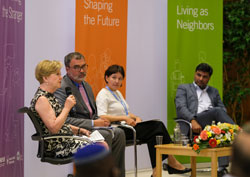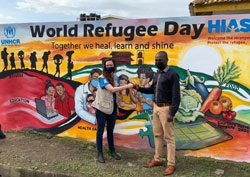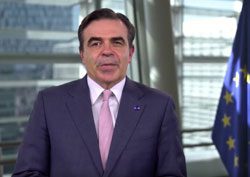Looking Back at 2018, Hoping for Peace in 2019
Dec 20, 2018

HIAS President and CEO Mark Hetfield during a trip to the U.S.-Mexico border with leaders of American Jewish organizations, August 2018.
(Jennifer Liseo/ADL)
Happy Holidays, and a Meaningful New Year!
As 2018 draws to a close, I have been thinking back to 1989 when I became a caseworker for the Hebrew Immigrant Aid Society (as HIAS was then known) in Rome. That was an amazing time to be living in Europe, working with refugees escaping Communism. And then the Berlin Wall came tumbling down. Humanity was coming together in 1989; walls were coming down and long-oppressed people were finally finding freedom.
Today, that film is playing in reverse. Walls are being built, and around the world leaders are sowing division and playing on fear.
HIAS, however, will not be drawn in. We will not follow the script of fear-mongering or hatred of the other. Nor will the many tens of thousands of people who support our mission. Together, we are for welcome.
In November, at our annual all-staff retreat, HIAS Education Director Rabbi Rachel Grant Meyer taught us that Judaism was the first religion to democratize the duty to welcome the stranger. We learned that treatment of the foreign born in our midst is not the exclusive domain of our leaders. Rather, for Jews there is a collective responsibility to welcome - a commandment repeated more times than any other in the Torah.
HIAS and our supporters worked hard to live up to that responsibility in 2018. While the U.S. administration is letting in fewer refugees than ever - at a time of greatest need - HIAS’ U.S. resettlement partners have been resolute, welcoming nearly 1700 refugees to communities across the country.
When the administration tried to close the border and separated children from their parents, HIAS and other organizations, with the support of millions of Americans, raised their voices and responded to help people exercise their right to seek asylum under U.S. and international law.
We intend to do much more in 2019 for asylum seekers along the border and around the country. This is a New Year’s Resolution we will not break.
This fall, over 300 Jewish congregations from 32 states, the District of Columbia, and Canada simultaneously joined to celebrate the first HIAS National Refugee Shabbat, to let refugees know that they are welcomed by the Jewish community. Among those were Congregation Dor Hadash (located in the Tree of Life synagogue) and Temple Sinai in Pittsburgh.
On October 27, a terrorist opened fire against the three Pittsburgh congregations housed in the Tree of Life building, taking the lives of eleven people who were there to pray. The terrorist made it clear that he was attacking them not just because they were Jews, but they were Jews who were helping refugees, whom he called “invaders.”
In the following hours and days, tens of thousands of people of all faiths responded with an unprecedented outpouring of support for the Jewish community, for HIAS partner Jewish Family and Community Services of Pittsburgh, and for HIAS, demonstrating support for our mission, honoring the memory of those who died and showing that we will not allow our values to be casualties of any hateful attack.
For millennia, a common Jewish greeting has been Shalom - peace. This is short for shalom aleichem, which means “peace unto you.” The proper response, is Aleichem, shalom, "unto you, peace." This custom of wishing peace to others is one that transcends Jewish tradition and cuts across lines of faith. Islam uses similar words with the same meaning, and, at Christmas time, Christians wish one another “Peace on Earth and Good Will Toward Men.”
My new year’s resolution for myself, and my hope for you, for America and the world, is that we internalize and externalize the greeting of Shalom, Salaam, and Peace on Earth Good Will to All - for ourselves, for all of our fellow Americans, and each of the millions of forcibly displaced persons from all over the world.
Shalom aleichem.
Mark





